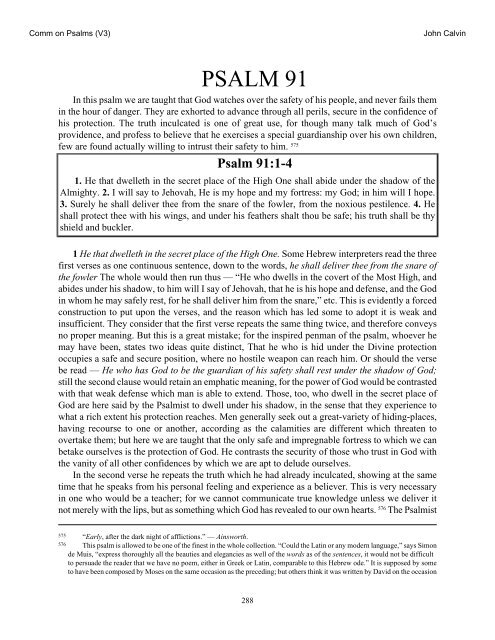Commentary on Psalms - Volume 3 - Bible Study Guides
Commentary on Psalms - Volume 3 - Bible Study Guides
Commentary on Psalms - Volume 3 - Bible Study Guides
- No tags were found...
Create successful ePaper yourself
Turn your PDF publications into a flip-book with our unique Google optimized e-Paper software.
Comm <strong>on</strong> <strong>Psalms</strong> (V3)John CalvinPSALM 91In this psalm we are taught that God watches over the safety of his people, and never fails themin the hour of danger. They are exhorted to advance through all perils, secure in the c<strong>on</strong>fidence ofhis protecti<strong>on</strong>. The truth inculcated is <strong>on</strong>e of great use, for though many talk much of God’sprovidence, and profess to believe that he exercises a special guardianship over his own children,few are found actually willing to intrust their safety to him. 575Psalm 91:1-41. He that dwelleth in the secret place of the High One shall abide under the shadow of theAlmighty. 2. I will say to Jehovah, He is my hope and my fortress: my God; in him will I hope.3. Surely he shall deliver thee from the snare of the fowler, from the noxious pestilence. 4. Heshall protect thee with his wings, and under his feathers shalt thou be safe; his truth shall be thyshield and buckler.1 He that dwelleth in the secret place of the High One. Some Hebrew interpreters read the threefirst verses as <strong>on</strong>e c<strong>on</strong>tinuous sentence, down to the words, he shall deliver thee from the snare ofthe fowler The whole would then run thus — “He who dwells in the covert of the Most High, andabides under his shadow, to him will I say of Jehovah, that he is his hope and defense, and the Godin whom he may safely rest, for he shall deliver him from the snare,” etc. This is evidently a forcedc<strong>on</strong>structi<strong>on</strong> to put up<strong>on</strong> the verses, and the reas<strong>on</strong> which has led some to adopt it is weak andinsufficient. They c<strong>on</strong>sider that the first verse repeats the same thing twice, and therefore c<strong>on</strong>veysno proper meaning. But this is a great mistake; for the inspired penman of the psalm, whoever hemay have been, states two ideas quite distinct, That he who is hid under the Divine protecti<strong>on</strong>occupies a safe and secure positi<strong>on</strong>, where no hostile weap<strong>on</strong> can reach him. Or should the versebe read — He who has God to be the guardian of his safety shall rest under the shadow of God;still the sec<strong>on</strong>d clause would retain an emphatic meaning, for the power of God would be c<strong>on</strong>trastedwith that weak defense which man is able to extend. Those, too, who dwell in the secret place ofGod are here said by the Psalmist to dwell under his shadow, in the sense that they experience towhat a rich extent his protecti<strong>on</strong> reaches. Men generally seek out a great-variety of hiding-places,having recourse to <strong>on</strong>e or another, according as the calamities are different which threaten toovertake them; but here we are taught that the <strong>on</strong>ly safe and impregnable fortress to which we canbetake ourselves is the protecti<strong>on</strong> of God. He c<strong>on</strong>trasts the security of those who trust in God withthe vanity of all other c<strong>on</strong>fidences by which we are apt to delude ourselves.In the sec<strong>on</strong>d verse he repeats the truth which he had already inculcated, showing at the sametime that he speaks from his pers<strong>on</strong>al feeling and experience as a believer. This is very necessaryin <strong>on</strong>e who would be a teacher; for we cannot communicate true knowledge unless we deliver itnot merely with the lips, but as something which God has revealed to our own hearts. 576 The Psalmist575 “Early, after the dark night of afflicti<strong>on</strong>s.” — Ainsworth.576 This psalm is allowed to be <strong>on</strong>e of the finest in the whole collecti<strong>on</strong>. “Could the Latin or any modern language,” says Sim<strong>on</strong>de Muis, “express thoroughly all the beauties and elegancies as well of the words as of the sentences, it would not be difficultto persuade the reader that we have no poem, either in Greek or Latin, comparable to this Hebrew ode.” It is supposed by someto have been composed by Moses <strong>on</strong> the same occasi<strong>on</strong> as the preceding; but others think it was written by David <strong>on</strong> the occasi<strong>on</strong>288
















